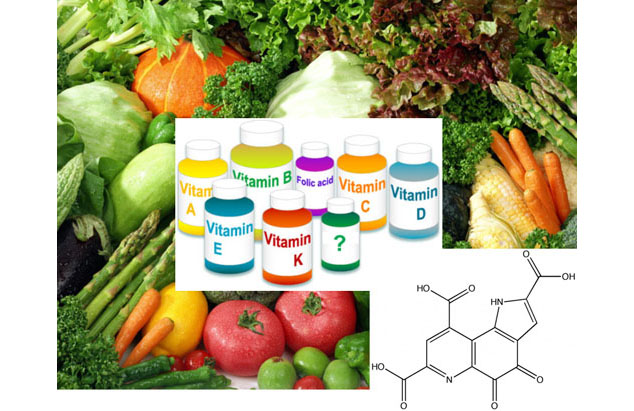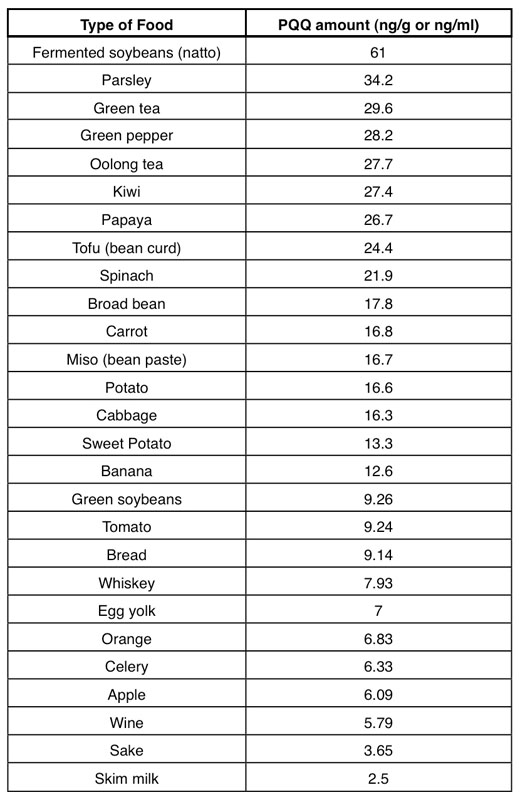 If you haven’t heard of PQQ yet, then take a look at why some scientists want this substance to be classified as a vitamin. It is a remarkable modern discovery that can perform miracles.
If you haven’t heard of PQQ yet, then take a look at why some scientists want this substance to be classified as a vitamin. It is a remarkable modern discovery that can perform miracles.
Vitamin PQQ – Really?
Well…almost. The substance in question is called pyrroloquinoline quinone (PQQ). It was introduced as a new vitamin in 2003 in this article in Nature:
Kasahara, T and Kato, T. Nutritional biochemistry: A new redox-cofactor vitamin for mammals. Nature 422, 832 (24 April 2003).
Nicotinamides and flavins are essential cofactors in enzyme-catalysed reduction–oxidation (redox) reactions and are classified as vitamins because they must be supplied in the diet. Another redox cofactor, pyrroloquinoline quinone (PQQ), was first discovered in bacteria and is also likely to be important in mammals, but the biochemical pathways in which it participates are unknown. Here we identify a PQQ-dependent dehydrogenase enzyme that is crucial for the degradation of the amino acid lysine in mice. PQQ is acting as a mammalian redox cofactor in this reaction, and therefore qualifies as a newcomer to the B group of vitamins. [Bolding mine]
Latest Update
Unfortunately, calling PQQ a vitamin in the first place apparently overstepped the bounds of the ‘vitamin rules’. Controversy ensued.
Ah, gotta love those scientists!
Fast forward to the present. The current general scientific agreement is that, although PQQ is not really a vitamin, it is a crucial and essential nutrient in our diet.
Why is PQQ So Important?
Although PQQ has been known only since about 1980, nearly 800 research articles have already been published on it.
What we know about it at this time entails a broad set of functions that underscore good health.
The main list of PQQ’s health benefits so far includes the following:
- Stimulates growth and serves as a cofactor for a special class of enzymes involved in cellular function including cellular growth, development, differentiation, and survival.
- Acts as an extremely powerful antioxidant capable of catalyzing continuous cycling (the ability to perform repeated oxidation and reduction reactions) to a much greater degree compared to other antioxidants. For example, PQQ is able to carry out 20,000 catalytic conversions compared to only 4 for vitamin C.
- Reverses cognitive impairment caused by chronic oxidative stress and improves performance on memory tests in animal models.
- Stimulates the production and release of nerve growth factor.
- Protects against the self-oxidation of the DJ-1 gene, an early step in the onset of Parkinson’s disease.
- Protects brain cells against oxidative damage in models of strokes.
- Blocks the formation of inducible nitric oxide synthase (iNOS), a major source of reactive nitrogen species (RNS) that are so damaging to brain cells.
- Protects against the likelihood of severe stroke in an experimental animal model for stroke.
- Protects the brain against neurotoxicity induced by other powerful toxins, including mercury, glutamate, and oxidopamine (a potent neurotoxin used by scientists to induce Parkinsonism in laboratory animals).
- Prevents development of alpha-synuclein, a protein associated with Parkinson’s disease.
- Protects nerve cells from the damaging effects of the beta-amyloid-protein linked with Alzheimer’s disease.
- Acts on key enzymes in the energy producing compartments in our cells – the mitochondria – thereby boosting cellular energy production.
- Specifically protects against oxidative damage of mitochondria.
If this list seems too sciencey, then just consider this: A main focus of current research is on the ability of PQQ to protect memory and cognition due to aging.
Parkinson’s and Alzheimer’s are the two biggies of interest here.
And Maybe the Most Important Benefit of All…
Your health and longevity absolutely depend on how well your mitochondria are working. (See: Live Long And Prosper With Healthy Mitochondria.)
Promoting the formation of new mitochondria (i.e., mitochondrial biogenesis) means that PQQ is a ‘fountain of youth’ for mitochondrial function. In other words, it is a fountain of youth for you in general.
Getting PQQ in Your Diet
The good news is that PQQ has been found in all plant foods examined so far, plus a smattering of other sources. The following summary gives you a good idea of how much you can get from certain foods (pay close attention to how much PQQ in each):

Note that the amounts of available PQQ are presented in ng (nanograms) per gram or per milliliter. A nanogram is a billionth of a gram.
Even thinking about how tiny these amounts are can be a challenge. Look at it this way: compared with amounts used in recent experiments, the level of PQQ from food sources is way too small.
Although we don’t yet know what the optimal dosages of PQQ should be, scientists generally agree that it is in the neighborhood of milligrams per day – i.e., in the range of a million-fold higher that what food sources can provide.
Specifically, the targeted amount for daily intake to reach optimal benefits is 10-20 mg of PQQ. That is why you will find supplements that provide one or the other of those amounts per serving.
Bonus for the Aging Brain
The effectiveness of PQQ on its own seems to be age-related. Animal studies show a synergistic effect between PQQ and CoQ-10. A recent human study discovered that people aged 40-70 did, indeed, improve in tests of higher cognition on 20 mg of PQQ per day. Moreover, those who also took 300 mg of CoQ-10 improved even more dramatically.
On the other hand, a small study of 10 subjects, aged 21-34, showed a significant decrease in inflammatory indicators after taking PQQ alone.
This leads to the current recommendation that most people under 50 may not need the simultaneous intake of PQQ and CoQ-10, while those over 50 do.
Heads Up on CoQ-10
If you are taking cholesterol-lowering statins, you absolutely must supplement with CoQ-10 regardless of your age. Statins interfere with your natural ability to synthesize this crucial metabolite.
Supplements of CoQ-10 come in two forms: reduced (ubiquinol) and oxidized (ubiquinone). The reduced form is about 8-fold better absorbed than the oxidized form. This means that a target dose of 100 mg per day of ubiquinol is plenty.
On a personal note, based on what I have discovered about PQQ and CoQ-10 for people in my age bracket (late 60s), I take 20 mg of PQQ and 100 mg of ubiquinol daily.
Nearly every supplement manufacturer offers both of these products in those amounts, so they aren’t difficult to find.
However, if you are looking online for them, consider getting them combined into one product, e.g., from my source, here: Jarrow Formulas Heart Health QH-absorb + PQQ.
Expect the Most Good Here…
Tissues that contain the highest number of mitochondria per cell (1000s) are led by liver, muscle, heart, brain, and brown fat. These tissues demand the highest levels of mitochondrial regeneration.
They are therefore the tissues where we can expect the greatest benefits from supplementary PQQ and ubiquinol.
All the best for mitochondrial health,
Dr. D
I started taking PQQ after I developed heart dysrhythmia (bigemini and brief pauses associated with dizzy spells); everything my cardiologist gave me either didn’t help or lowered my already normal pressure and triggered a migraine. I learned of PQQ from an internet ad and investigated just a bit. I learned of the mitochondria stimulant effect and it seemed appropriated since I had a history of cancer treatment with doxorubicin. I had reached my maximum lifetime dose years ago, knowing that this drug kills mitochondria. At first I took PQQ with Co-Q10 and it did not give me side effects and within a few days the dysrythmia symptoms were gone. My pulse was regular. Because I am a nurse and worked on a unit where telemetry was available, I was able to confirm sinus rhythm with an EKG.
As if this wasn’t enough to praise PQQ, I was watching my 15+ year old Golden Retriever deteriorate as hind end weakness progressed. I had to try something. The very first day I gave him a full 10 mg of PQQ, he walked around our yard for 4 hours instead of taking his nap, but he seemed very sore afterward. I couldn’t find anything online about PQQ in dogs, but we started sharing the 10 mg capsule between he and I each day. He improved greatly and lived another year. At his 16-year vet check, Dr. B said “he isn’t old, he’s ancient” . ‘There is nothing I can test or recommend. Whatever you are doing, keep doing it.’ He made it to 16 years and 7 months – an extraordinary age within a breed that normal averages 10-12 years. This year when a friend’s much younger dog was declining already and getting a vet work up, I mentioned the PQQ. She also saw the immediate energy boost in her dog.
As for myself, I still take PQQ occasionally, especially if my dysrhythmia returns (usually after stress and poor diet slip up). Since I experienced from PQQ that my solution to low energy is not calories, I have found that a high dose of dark leafy green vegetables (contains PQQ) seems to allow the other calories I consume work for me. So if I start excess food seeking – trying everything in sight to restore energy – I eat a large, fresh, dark green salad (usually kale because I like it) including various seeds or other source of a few calories and the binge will stop. There is no way this salad contains 10 mg of PQQ but, I feel that like many other good nutrients, PQQ probably does well in a mix with other naturally available nutrients. (I have lost 10 pounds in the last year.) While the 10 mg dose is therapeutically effective for signs of depletion, I’ll bet a maintenance dietary need is considerably lower.
Hi, Karen:
What a fantastic story. All the research on PQQ comes across as ‘sterile’ until I hear successes like yours. That makes is personal. Thank you so much for sharing. I bet you’re right about dosage. Studies are generally short term at the 10 mg dose, so results can show up before too long. Your bio-hacking experiment shows that we don’t need all that. I love your comments about your dog, too. It gives me a new tool for keeping my own healthy as they age. By the way, I’ll write more soon about DHA, since that particular fatty acid is THE most critical factor in keeping mitochondrial membranes working well. Stay healthy!
All the best,
Dennis